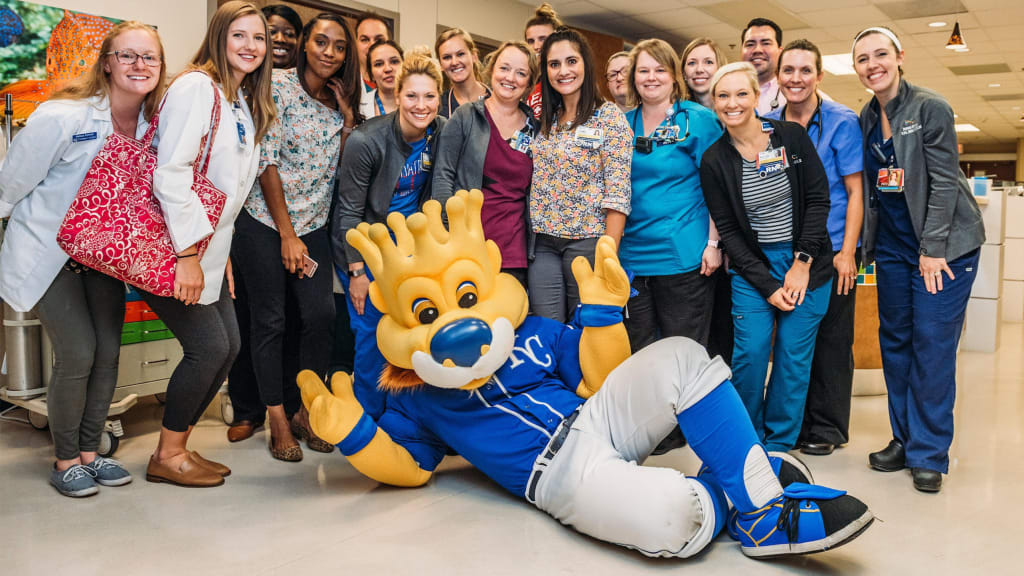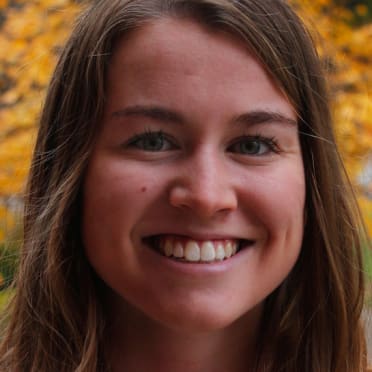
KANSAS CITY -- A day after the Royals’ offices closed in March 2020 because of the coronavirus pandemic, executive director of Royals Charities Amanda Grosdidier received a call from Royals chairman/CEO John Sherman.
Grosdidier recalls Sherman asking one question about the organization’s response to fight the pandemic in Kansas City: “What can we do to help?”
That question has sparked more than a year’s worth of work in the Royals’ community impact department and in Royals Charities to help curb the effects of the pandemic in the Kansas City area. And it has led to Friday, when the Royals were named the 2021 recipient of the Allan H. Selig Award for Philanthropic Excellence for the club’s “Response to Recovery” effort that utilized the Kansas City Urban Youth Academy as a community resource, specifically aimed for residents where the academy is located in the 18th and Vine District, a predominately Black community that was one of the most affected areas in the city.
“On behalf of Major League Baseball, I congratulate John Sherman and the entire Kansas City Royals organization for this well-earned recognition of service to their community,” Commissioner Rob Manfred said in a statement. “Their efforts provide a model on how organizations can make a meaningful impact in underserved areas that were most negatively affected by the pandemic. I am especially thankful for their support of the 18th and Vine District, a special place for our sport that houses both the Negro Leagues Baseball Museum and the Royals Urban Youth Academy. Philanthropy is a cornerstone of baseball’s connections to our communities. I commend the Royals and all our clubs for all that they do year-round to give back to those most in need.”
Sherman, in a statement, said: “Our entire organization is humbled by the award, especially as all 30 MLB clubs do impactful work in our communities. I am grateful for the commitment and passion of our associates and am inspired by their resiliency. There is much more to do. The work continues, with gratitude for the opportunity to support the region we love.”
Throughout 2020 and ’21, the Royals focused on turning the Urban Youth Academy into more than a hub for baseball and softball activities. After seeing how education was taking a hit during the pandemic, they turned the academy into a host for education programming and a makeshift community center, specifically focused on serving the historic 18th and Vine District, one of the hardest-hit when the pandemic shut down schools, jobs and in-person activities.
Additionally, the KCUYA hosted more than a dozen voting machines for the November 2020 election, and the Royals partnered with World Central Kitchen to provide free meals to voters. Around 1,300 people came to vote at the KCUYA, according to the organization. The academy was also a vaccination site and provided 4,440 doses of the COVID-19 vaccine.
This is the Royals’ first Selig Award, and it comes in Sherman’s second year as majority owner. The other finalists for this year's Selig Award were the Braves, White Sox, Nationals, Cubs, Dodgers, Marlins, Padres and Rays. Read more about each of those club's initiatives here.
“It’s a very special honor to receive this award, especially named after Commissioner Selig,” Royals president of baseball operations Dayton Moore said. “It represents everything we believe in as an organization. It’s much bigger than baseball. What our staff was able to do, navigating the pandemic to still provide for the community -- we needed leaders to step up, and I’m grateful and appreciative that we have people like them who care.”
The day that Sherman called Grosdidier, she and her team began making calls around Kansas City and created the Royals Response Fund, which provided more than 500,000 meals around the city, grants for 17 nonprofits and the organization’s staff for volunteer efforts.
But as the pandemic continued, the Royals realized they could do a lot more by using their facilities, specifically the KCUYA, as a resource for people in the community.
“The further that it went with kids not being able to go to school, we started with hot spots, providing laptops for kids,” Grosdidier said. “But this shifted to what we could do with our facility. We can’t play baseball and softball right now, but we can use the facility that we have and get kids the opportunity to come in, to learn.”
Royals Charities developed a distance learning program at KCUYA for the 2020-21 school year, registering students from 17 middle and high schools to use the space as a safe environment for remote learning. Several retired teachers volunteered their time or were brought on as part-time workers to act as proctors and help students with what they needed, whether it was connecting to a class or tutoring a subject.
The program ran all day, keeping everyone socially distant, and several extracurricular courses were included -- baseball and softball drills ran by the Royals’ baseball operations department, character and leadership lessons, drivers’ education, foreign language and ACT preparation.
“We created a safe, healthy, disinfected space for kids to gather safely and do life together,” said Kyle Vena, the Royals’ vice president of community impact. “They’re doing school, they’re playing baseball and softball, they were having lunch. They were connecting, being kids. That’s what I think everybody needed.”
The Royals also used virtual learning to their advantage, too. Since 2018, the KCUYA has hosted an in-person science technology, engineering and math (STEM) curriculum, in partnership with Science of Baseball, to approximately 500 students in the area each year. When schools went to virtual learning, Royals Charities trained teachers online and adjusted curriculum and materials to better serve students. The curriculum reached more than double the number of students served in 2019 because of the virtual learning aspect.
This past summer, the KCUYA hosted a free 10-week program designed to prevent the “summer slide” -- when students fall behind in school during summer break -- specifically in underserved areas. Royals staff and volunteers facilitated the program five days a week, and the aSTEAM Village -- a local program -- taught reading, science, technology, engineering, art and math courses.
The goal was to provide an in-person and safe opportunity for students in the area to be prepared for this school year. And the results, so far, have been better than what the Royals expected.
According to Royals Charities, 49 percent of the distance learning program students who completed a social and emotional learning assessment demonstrated a positive change in at least one category. Data collected by McKinsey & Co. found that, on average, U.S. students were five months behind in math and four months behind in reading after summer break. Students who completed the Royals’ summer learning program were on pace in reading and showed a six-month gain in math ahead of the 2021-22 school year.
“Not only that, but anecdotally we’ve been hearing stories,” Vena said. “We’ve got parents reaching out saying, ‘I just had my first-quarter parent-teacher conference, and my child has always struggled in math, and the teacher is telling me that math is her strongest subject.’ That’s rewarding, and we’re honored we played a part in it.”
And the Royals’ efforts won’t stop with one award.
“With Mr. Sherman taking over, one of the bigger things they want to see is community impact long term,” Grosdidier said. “So not just fitting the needs as they come, but also making long-lasting impact. To be able to do this, we can monitor the kids going forward and build those relationships, be there as a resource for those kids. It doesn’t stop here.”


